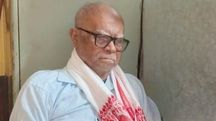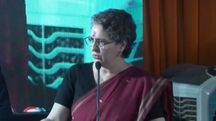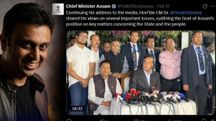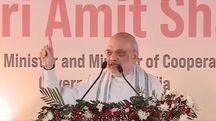Signing of Bodo Peace Accord a Calculated Move by BJP to Stay in Power?
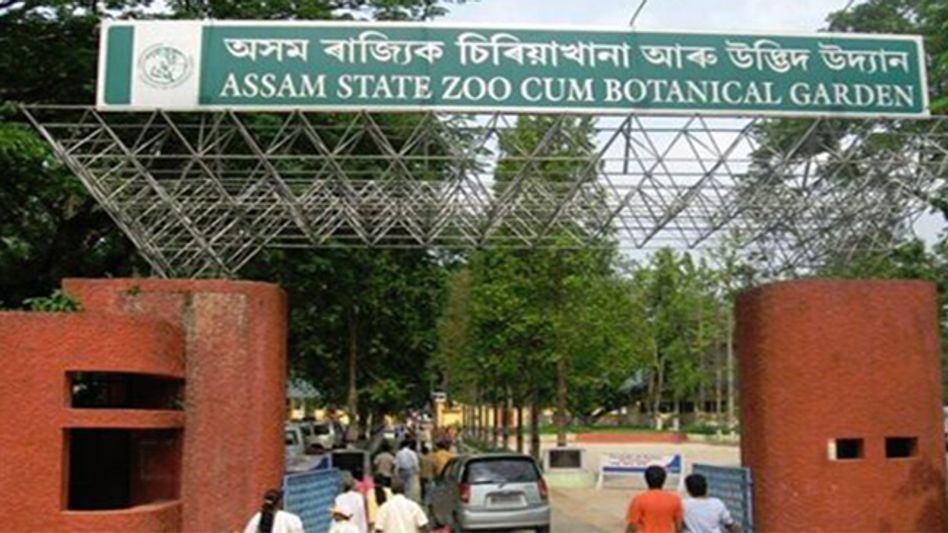 File photo: Bodos celebrate the signing of the 'Accord'
File photo: Bodos celebrate the signing of the 'Accord'-Kiran Basumatary
It is no hidden fact that the Northeast of India has been burning for more than a month now with the CAA issue. Assam, especially, has been the boiling point and is leading the protest against the act which they feel is a threat to their identity. The people of Assam have been quite uni vocal in their stand against this act and people from all ethnicities, tribes and walks of life have come out against this it. It is of very little doubt that, with the prevailing circumstances, the people of Assam do not wish to bring the BJP government back in power in the next elections. However, the signing of the Bodo Peace Accord seems to have changed the political scenario to an extent.
The situation seems to be very grim for the BJP in the Northeast as they are fast losing the support from the masses and public sentiment seems to be heavily against what has now been termed “a fascist government”. Part of the anger of the Assam people is not even with the act directly but at the way the situation has been handled by the government and the suppression that is taking place, especially the violence that erupted on the 12th of December. The people of Assam and the Northeast are now depending on the Supreme Court for a ruling that will go in their favour and throw out this act.
All this is now the background of another ground-breaking event in the Northeast which the people are not talking about. Several insurgent groups (most primarily among them the NDFB (S)) have come out and declared a ceasefire. The ceasefire of the NDFB (S) officially brings to a close the armed movement of the Bodo people. The hardliner militant group is however still adamant on their demand for a separate Bodoland state and it is their primary demand for an official surrender. This landmark event is set to change the entire landscape of the Northeast and may very well be a huge step towards the end of insurgency in the Northeast. The Bodos have been demanding a separate state for themselves for decades and this demand is the sole fuel that has been keeping the Bodo insurgency going. If the current government reaches an agreement with the NDFB (S) then the long burning fire in Bodoland might finally be put out.
ALSO READ: Sarbananda or Sarabanananda Sonowal? Asom Sahitya Sabha Misspells CM’s Name, Trolled
The only thing that the Bodos and the people of the Northeast have to fear however is the peculiar timing of this event. The BJP led government both at the centre and the state had so far not shown any indications of reaching to such an agreement with the insurgents and in fact had taken a stronger anti-insurgency stand in the recent years than the governments before. The NDFB ceasefire coming in the midst of the CAA agitation cannot be a co-incidence and seems to be a very well laid plan by the BJP to appease the people and stay in power.
The Bodos and the Assamese have always had an uneasy alliance; a mutual relationship of necessity at best. The two communities form the largest ethnicities in the state of Assam and have long lived together peacefully but wary of each other. The Bodos have felt for decades that they have been suppressed by the Assamese who have tried to impose their language and culture on the Bodos. Obviously the Assamese being the majority population of Assam and always being at the seat of power in Dispur have had political dominance over the Bodos and this, the Bodos feel, has been used unjustly by the Assamese to oppress Bodo voices. The Bodos thus feel that the only way that true liberation and freedom can be achieved is by way of a separate state governed by the Bodos themselves. This is in fact not an isolated matter and is a common pattern in many inter-tribal rivalries of the region.
This rivalry among the two largest ethnicities in Assam is also the main reason why the Bodos have not been very vocal in their stand against the CAA. The ABSU (All Bodo Students Union) has also come out and stated, albeit in a very diplomatic way, that they are not in support of any such act which undermines the interests of the indigenous people and are in solidarity with their Assamese brethren in the anti CAA movement, pretty much saying that the ABSU stand is anti CAA. However, in the very same statement, the ABSU president also mentioned that given the ongoing situation in Bodoland and underlying animosity with the Assamese, neither are the Bodos in a position nor in an interest to come out in a full fledged physical agitation against the CAA along with the Assamese. The anti CAA movement thus in Bodoland has mainly been from non-Bodos.
Among the Bodos, the CAA still remains to be a debatable topic and while many have come out against it, there are still a good amount who can be seen standing with the BJP led government in their decision. Frustratingly however, and in a genius diplomatic move, none of the Bodo groups have taken any official stand on the CAA. The BPF, which is the political representative of the Bodos, has been seen standing with the BJP government on the dais and extending full support to them but are yet to make any statement on the issue. This does not come as a surprise as the BPF was always expected to be more concerned about the Bodo people and their demands rather than the bigger machinations of New Delhi and Dispur.
What all this means is that there are only two regions in Assam where the BJP is seeing any form of support. The first one is the Bengali majority Barak Valley, where no voices at all have come out against the CAA, and the other one is the Bodoland Territorial Autonomous Districts (BTAD) where, even though there are voices of protest, they are very isolated and unofficial.
The BJP clearly sees this as an opportunity, the Bodos are a group of people who still seem rather undecided at this point and may swing either way on the CAA matter. If the BJP were to however give something to the Bodos to make them happy, the Bodos may end up tilting heavily towards the BJP. And this seems exactly the point with the NDFB talks. The CAA movement and not the CAA itself seems to be a blessing in disguise for the Bodos.
It is highly unlikely however that the Centre will grant a separate state to the Bodos even at this point of time and is most likely to give Union Territorial Council status to the BTAD as the sources report. BTAD is most likely to become the BUTC and expanded to cover more areas. The BJP clearly feels that this is a move that will win over the Bodos and the upcoming elections will result in a clean sweep for them from at least the Bodo dominated areas. This is actually a truth and something most likely to happen if the BUTC comes to fruition; with so many central and state governments coming and going and not doing anything for the Bodos or their demands, this move by the current BJP led government is sure to win over the Bodos and guarantee their support.
This seems to be a clear divide and rule ploy by the BJP that will pit the Bodos against the Assamese, who are majorly against the BJP led government now. However, what the BJP has failed to take into account is that this might actually be their biggest folly in the Northeast and the final nail in their coffin. There are a few very important points that the BJP has not thought of which will clearly not go their way. The first and foremost of which is the support from the Bodos itself. It is true that this move by the BJP will definitely win over Bodo support but it is unlikely that they will win over the Bodo votes. For the Bodos, the champions of this movement will still remain to be the BPF and the NDFB. And when the election comes around the corner, they are very unlikely to pick a national party over their own Bodo leaders.
It will not be Sarbananda Sonowal or Narendra Modi who will be remembered by the Bodo people but Hagrama Mahilary and Ranjan Daimary who will be etched in the Bodos’ memories. The formation of a BUTC or a separate Bodoland only means that the Bodo leaders will become even bigger heroes and will be the ones voted to power by the Bodo population. It is true that the BPF is a BJP ally and has stood with them in the CAA mess but Bodo politics is something very different from what happens in the rest of the country. While the rest of the country is burning in the fire of religion and nationalism, Bodo politics is born out of identity and culture, as is the case with most of the Northeast. So, it is true that the BPF will be obliged to remain BJP allies but if the BJP led government does indeed fall in the next elections, the BPF is most likely to remain in power and the allegiances might then be forgotten. It has never really mattered to the Bodo political leaders as to which government has actually come to power in Dispur or New Delhi.
The Bodo leaders will always put the needs and concerns of the Bodo people forward and if that means siding with the Congress or whichever other government in the next term, the BPF will not hesitate to do that as well. The BPF is not a party which would need the BJP in their election campaigns, rather it is the BJP who would need the BPF’s support.
The other important factor that the BJP has forgotten to take into account is the BTAD demography. Although the Bodos are the majority in the BTAD, they are a very small majority. As per the last census, only about 38% of the population of BTAD are actually Bodos. The rest is an amalgamation of Bengali Hindus, Muslims, Assamese and a diaspora of other tribes and ethnicities. In fact, out of the 40 seats in the BTC (Bodoland Territorial Council) assembly, the BPF although being the absolute majority only has a total of 20 seats. 4 seats are with the Islamist party AIUDF, 1 with the BJP and 15 with independent candidates.
The BJP risks alienating all these other voters with the BUTC move. While the Bodos will have been won over and the Bengali Hindus still well in their kitties, it might still not be enough if all the other demographics end up becoming anti-BJP. The Bodos themselves have to tread very carefully as it is a marginal majority that they currently hold in their own turf. If the opposition were to garner up enough anti-Bodo sentiments and form a grand alliance, then a peculiar situation of Bodos being political minorities in their own territory will then arise which will be an even bigger problem for the Bodos then it already is. But the problem for the BJP will be even bigger as the BPF and the Bodos will still survive but such a political onslaught will definitely kick the BJP out of the region.
So, it is clearly in no small terms that the BJP government is actually playing a huge gamble with the ongoing Bodo peace talks. But the only good thing that has come out of it perhaps for the Bodos is that this has effectively now put the ball in the Bodos’ court rather than the government’s. Whether BJP remains in existence in the BTAD will now be something decided by the Bodos and not the other way around. In the process of trying to win over the Bodos, the BJP has ended up creating such a situation for themselves that they might either flourish or completely be taken out of existence from the region.
As far as the Bodos are concerned, they will be happy either way. The dream of a separate homeland for them seems to be very close to fruition now and they might settle for the compromise of a UTC rather than a fully-fledged state. Either way, BJP or no BJP, the Bodos are one step closer to becoming their own political bosses and gaining autonomy. The only thing that the Bodos need to be wary about however, is the underhanded tactics that national parties often employ.
ALSO READ: Tripura Govt Sets Up Isolation Ward in Agartala to Fight ‘Coronavirus’
The formation of the UTC may be used as a rallying cry by both the BJP and the opposition to fuel animosity between the Bodos and non-Bodos. The Bodos need to be careful that they do not fall into these designs and ensure that Bodoland does not fall back into the days of the violence of decades ago. As for the CAA? The Bodoland stance is not likely going to change the attitude of the Bodos towards the CAA but the only concern is that the districts in the BTAD and also other regions in Assam might be somewhat distracted with this issue and move on from the CAA agitation, which is something that the agitators themselves have to be determined not to. I wish both the Bodos and the Assamese the best of luck in their endeavours and would conclude by highlighting that there is no reason why the Bodos and the Assamese need to see an enemy in each other. Both slogans can very well co-exist and hopefully continue to do so: Jwi Boro Harini. Joi Aai Axom.
Support Inside Northeast (InsideNE), an independent media platform that focuses on Citizen-centric stories from Northeast India that are surprising, inspiring, cinematic and emotionally relevant.
Readers like you make Inside Northeast’s work possible.
To support our brand of fearless and investigative journalism, support us HERE.
Download:
The Inside Northeast app HERE for News, Views, and Reviews from Northeast India.
Do keep following us for news on-the-go. We deliver the Northeast.
Copyright©2026 Living Media India Limited. For reprint rights: Syndications Today


